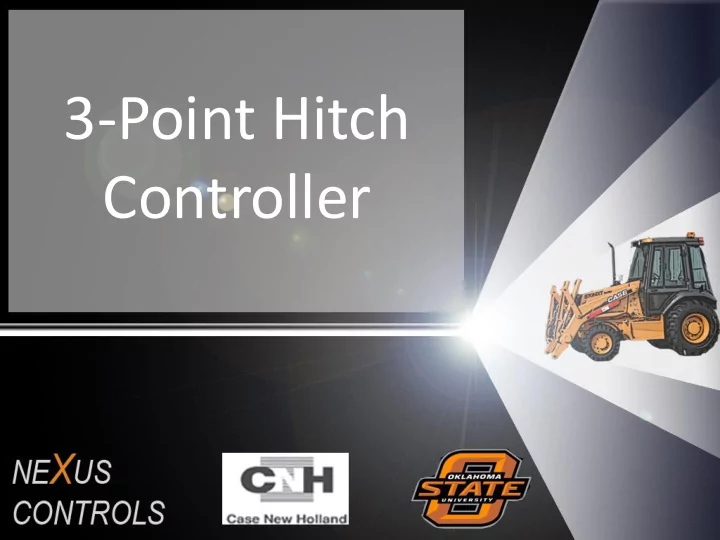

3-Point Hitch Controller
December 7
Presentation Overview • Background Information • Design Concepts • Engineering Specifications • Future Plans
Nexus Controls • David Bevill, Bio-Mechanical Option • E. Evans Chambers, Bio-Mechanical Option • Lee Eldridge, Bio-Mechanical Option • Adam Gossen, Bio-Mechanical Option • Develop a functional, ergonomic, and innovative three point hitch controller
Introduction • CNH is a leader in the agricultural and construction equipment industry • Innovative needs of the future lead to the development of new products with latest technology • CNH contacted OSU BAE Department to produce ground-breaking solutions for unique design challenges
Problem Statement • Design and employ a three point hitch controller in order to maintain user defined implement position • Design should involve minimal change to existing unit while functioning ergonomically • Cost must be considerably lower than current optional laser guided control system
Statement of Work • Select controlling mechanism to regulate 3 point hitch position to further the capabilities and performance of the Case 570 MXT • Design shall include sensors to measure hitch position, controller to interface between sensors and laser system, and wiring, additional parts information, etc.
Patents & Market Research • Patent 1: Towable Box Grader with Multi-Variable Axis • Patent 2: Apparatus for Counteracting Vehicle Pitch Variation • Patent 3: Dynamic Controller of Excess Down Pressure • Patent 4: Hitch Control System with Spring Centered Lever • Determined our intended design will not infringe upon current competitor machines
Customer Requirements • Two modes of operation – Automatic – Manual • Manual control can over ride the automatic control function. • Cost – Minimize – Off the shelf or in-house components
Customer Requirements Cont . • Interface with existing system – Hydraulics – Electrical • Down force capability – Controller mode must have down force like manual operation.
Design Concepts • Potentiometer Location Above: Picture of Rocker arm Right: Picture of Rocker arm pin and Potentiometer location Pictures From CNH
Design Concepts Cont . • Controller location – Inside the console • User interface on Console – Controller in a box hangs on ROPS • Pros: Easy to access and connect to machine. • Cons: Laser Controller box attaches at same position.
Design Concepts Cont . • Safety – Controller would be inactive upon start of machine. – Set button • Must press the button after determining set point. – Resume button • Must press to return to Controller mode after using manual controls.
Design Concepts Cont. • User input – Dial • Potentiometer – Cruise control method • Set the depth manually then press set button • Resume button to return to previous depth
Design Concepts Cont . • Unachievable set point – Controller depth setting is not reachable due to ground conditions. • Pump would go over relief – Oil would heat up • Rear of machine would lift up – Decrease in traction of rear tires
Design Concepts Cont . • Laser controller and Potentiometer with controller on same machine. – Require a special wire harness to connect both options. – Would need a switch to select between the two systems. – Note: These options can not be used together at the same time!
Potentiometer • Actual Device • Actual Circuit Diagram • Effective Circuit Diagram http://en.wikipedia.org/wiki/Potentiomete r
Potentiometer • Linear Resistance • Rate Change Voltage/Degree 5 V V V w 0 . 033 150
Controller • Output www.wikipedia.org • Accuracy – 12 Bit A/D 5 V Voltage Increment . 0012 V 1 mV 12 2
Height = f(Voltage) (Idealized Case) v Angle Accuracy . 001 v 0 . 0333 . 03 1 H 3 ft sin( ) 3 ft sin( ) box box measured 3 Measured Angle 1 measured box 3 Box Height Angle Courtesy CNH
Pulse Width Modulation • Valve accepts PWM • %ON/%OFF • Mass of Spool/Stable Position • Flow Rate Control Courtesy CNH
Solid State Device • M.O.S.F.E.T • Additional Drivers - Solenoid Current • Applicable to “A” and “D” • Allows for PWM http://en.wikipedia.org/wiki/Mosfet
Circuitry 5V 5V Dial Input Sensor 5V CPU SET Valve P. S. = 5V ON DC
Recommended Solution • Tri-Logic PLC Controller – For Testing & Design – Built-in PID Function – Multiple IO – Inexpensive & Robust Reference Tri-Logic
Recommended Solution (cont’d) • Input – 1 potentiometer for reading position – On/Off, Set, and Resume Functions – Manual control input (Already Provided) • Output – PWM to control hydraulic system – Possible analog/digital gauge for set point and/or current position
Controller Logic & Simulation • Controller logic will be very similar to that of an automotive cruise control – Logic will be developed in a flow chart – Programmed into controller using BASIC • System will be simulated in Matlab
Future Schedule • 1/1/07-1/30/07: Familiarize with machine & order parts • 1/30/07-2/30/07: Build and install prototype • 2/30/07-3/30/07: Implement, test, and debug controller • 3/30/07-Finished: Finish up testing, make ready for presentation
Proposed Budget Part Estimated Cost Potentiometer $50.00 Pin Kit $15.00 Controller $125.00 Pressure Transducer $35.00 Boss & Cover $50.00 $275.00 Total
Acknowledgements Mr. Wayne Kiner Dr. Marvin Stone Dr. John Solie Dr. Paul Weckler Members of CNH
Any Questions ?
Recommend
More recommend